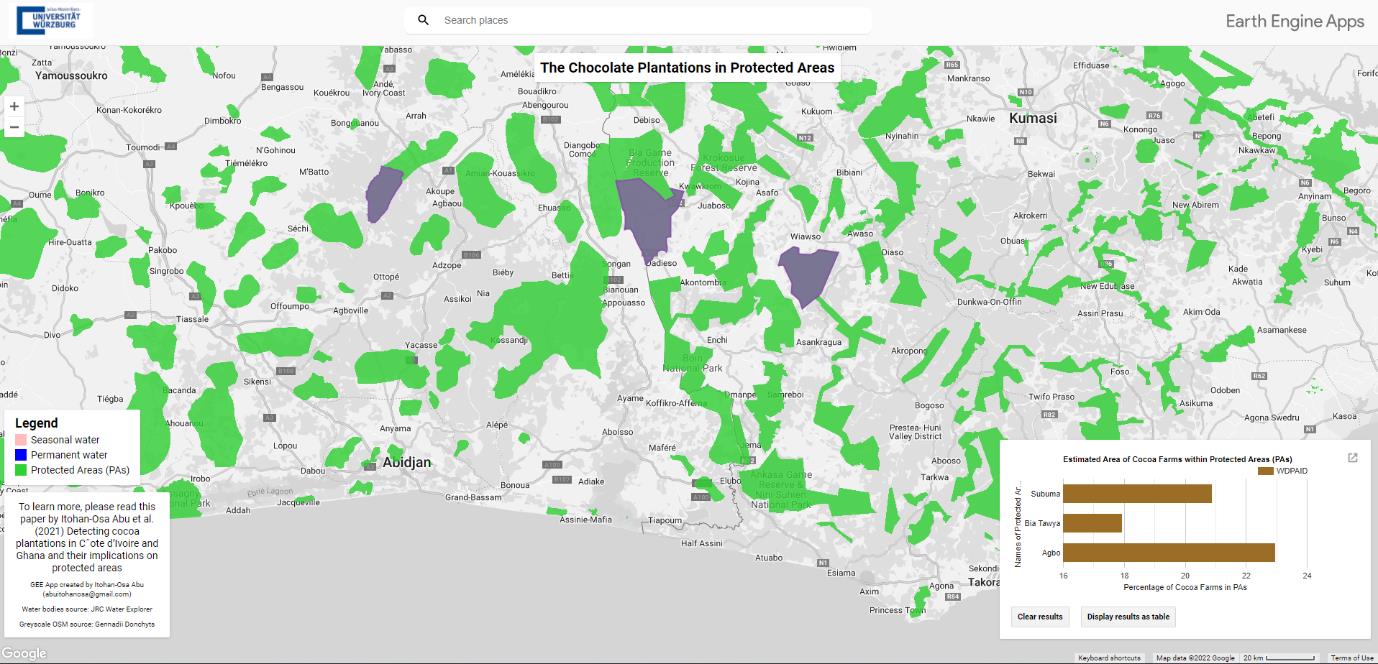GeoSens Training EO4GEE
Online I February 20 – 24, 2023 I WürzburgUnfortunately, we have to cancel the Geosens EO4GEE training “Introduction to Remote Sensing with the Google Earth Engine” (February 20 – 24, 2023) due to a lack of registrations. We hope to hold the training later in the year of 2023. All people registered so far will be informed separately about the cancellation.
Data access & integration
Learn about Raw Data types, integrate them into your work and acquire theoretical knowledge
Hands on Exercise
Selection of data, software and processing platform with case study
EO applications in research projects
Gain insights into existing research projects through presentations by our specialists and discuss their contents
Please send your documents to the following email address:
“eo4intdev@uni-wuerzburg.de“
We will contact you with confirmation of your registration.
Introduction to Remote Sensing with Google Earth Engine
This training addresses advanced persons interested in the analysis of satellite imagery and spatial datasets and is dedicated to the provision of the principles of Google’s cloud infrastructure Earth Engine for earth science data and analysis. The training aims at enhancing the knowledge for developing and implementing a workbench (e.g., download of data, pre-processing, derivation of indicators and phenological indices, analysis, spatial prediction, mapping, and interpretation) for spatially analyzing and visualizing remote sensing data. Monitoring and Evaluation (M&E) in the sense of derivation, analysis, and interpretation of time series are part of this training. The nexus of climate change – adaptation to climate change – land cover and land use – will be addressed in targeted examples and taken up in an exchange with the participants and the GeoSens team.
During a total of five days, the training “Introduction to Remote Sensing with Google Earth Engine” (EO4GEE) will provide an overview of the principles of cloud computing and particular of the Google Earth Engine (GEE) and its huge potential for satellite imagery analysis to drive change detection, to conduct, quantify and visualize map trends and differences. Upon the provision of knowledge on how to manage and retrieve data from the multi-petabyte earth data catalog, the participants will learn the function and possibilities of the timelapse functionality and the workspace in the earth explorer. Based on provided coding examples for image manipulation visualization, image statistics, and spatial and spectral subsets visualization, the participants will be enabled to master their own GEE geospatial project for their analysis and reporting purposes, such as in the context of land cover (e.g., forest) monitoring.
The training EO4GEE will be held by the GeoSens team, a non-profit training initiative run by a collective of researchers and experts from the Department of Remote Sensing at the Julius Maximilians University of Würzburg (Germany) and the German Remote Sensing Data Center at the German Aerospace Center (DLR). The EO4GEE addresses advanced persons with sound knowledge in geospatial (e.g., vector and raster data) and remote sensing data and exploratory analysis who are ideally familiar with programming, with the Python syntax (e.g., Jupyter Notebook) and have worked with basic Python libraries, such as Numpy, Pandas, Matplotlib, Geopandas, and Rasterio before.
The training will take place in presence, hosted by the Department of Remote Sensing in Würzburg. Depending on the covid 19 pandemic situation and regulations, we would, if necessary, substitute the possibility of online training. In this case, the training will be provided online via the platforms MS Teams/Zoom. In case the training is held online, the GeoSens team seeks to provide the opportunity to meet virtually in smaller groups (breakout rooms) to ensure more detailed discussions and exchanges.
The participants of the five-day training will obtain a hard copy of a workbook containing theoretical and practical (e.g., coding examples useful for multiannual analysis in the context of M&E) information, and links to open-access data, and data portals.
Additional Information
| Type | Theory and practice |
| Goal | Gaining theoretical knowledge and practical skills that will enable the participants to master their own remote sensing project using Google Earth Engine and the Earth Explorer. |
| Precondition | Advanced persons with sound knowledge in spatial data (e.g., vector and raster data), satellite imagery, and geospatial analysis, as well as in programming syntax. Previous participation in the GeoSens trainings EO4IntDev and EO4GEE is advantageous but not a must. The GeoSens team encourages the participants to bring their own data, meaning that; If the participant has spatial data and a specific use case from a project that could be assessed further, we will be available to assist during the training. |
| Duration | Five (5) consecutive days with sessions in the morning and afternoon (~ 5 hours per day). |
| Adds-on | Training material (i.e., workbook and note pad, installation guide for GEE, coding examples), access to the Q&A Forum hosted by the Department of Remote Sensing in Würzburg, exchange with participants and trainers in an international group, certificate of participation after completion of the training. |
| Trainers | GeoSens team, a collective of researchers and experts from the Department of Remote Sensing (University of Würzburg) and the German Aerospace Center (DLR). |
| Fee |
979.00 Euros Cancellations by participants up to 20 calendar days before the start of the training are free of charge. Please use eo4intdev@uni–wuerzburg.de for this purpose. For later cancellations, please also send a written request to eo4intdev@uni–wuerzburg.de. If no substitute participants can be named for cancellations at short notice up to 20 calendar days before the start of the training, the costs will be charged in full. |
| Next training dates | 20th to 24th of February 2023 |
| Training capacity | 15 to 25 participants |
Be kindly informed that the arrangement of travel and accommodation in conformity with all rules and regulations (incl. in relation to Covid-19) is your own responsibility.
Got interested?
Get in touch with us!

